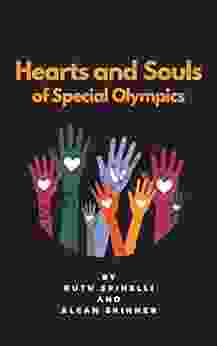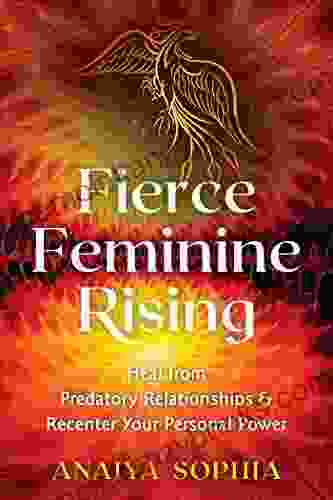Heal From Predatory Relationships And Recenter Your Personal Power: A Comprehensive Guide

Predatory relationships are characterized by a power imbalance, where one person (the predator) exploits the other (the victim) for their own gain. Predators often use manipulation, coercion, and even violence to control their victims. This can lead to severe emotional, psychological, and physical damage for the victim.
If you have been involved in a predatory relationship, it is important to know that you are not alone. Many people have been through similar experiences, and there is help available. This guide will provide you with the information and tools you need to heal from the trauma of a predatory relationship and reclaim your personal power.
The first step to healing is understanding what a predatory relationship is. Here are some of the key characteristics:
4.7 out of 5
| Language | : | English |
| File size | : | 7976 KB |
| Text-to-Speech | : | Enabled |
| Screen Reader | : | Supported |
| Enhanced typesetting | : | Enabled |
| Word Wise | : | Enabled |
| Print length | : | 262 pages |
- Power imbalance: The predator has more power than the victim in the relationship. This power imbalance can be based on physical strength, financial status, social status, or emotional manipulation.
- Exploitation: The predator exploits the victim for their own personal gain. This can include financial exploitation, sexual exploitation, or emotional exploitation.
- Control: The predator uses manipulative tactics to control the victim's behavior, thoughts, and feelings. This can include gaslighting, isolation, and threats of violence.
Predatory relationships can have a devastating impact on the victim's life. Victims may experience:
- Emotional abuse: The predator may use verbal abuse, humiliation, and intimidation to control the victim. This can lead to feelings of low self-esteem, shame, and guilt.
- Psychological abuse: The predator may use gaslighting, manipulation, and isolation to confuse and disorient the victim. This can lead to feelings of anxiety, depression, and paranoia.
- Physical abuse: The predator may use physical violence to control the victim. This can lead to injuries, pain, and even death.
Healing from a predatory relationship takes time and effort. However, it is possible to overcome the trauma and rebuild your life. Here are some tips for healing:
- Seek professional help: A therapist can help you to understand the dynamics of predatory relationships and develop coping mechanisms for dealing with the trauma.
- Join a support group: Support groups can provide you with a safe space to share your experiences and connect with others who have been through similar experiences.
- Practice self-care: Self-care is essential for healing from trauma. This includes eating healthy, getting enough sleep, and exercising regularly.
- Reclaim your personal power: It is important to reclaim your personal power after being involved in a predatory relationship. This means setting boundaries, asserting yourself, and making decisions for yourself.
Recentering your personal power is an essential part of healing from a predatory relationship. Here are some tips for recentering your power:
- Identify your strengths: What are you good at? What makes you unique? Identifying your strengths will help you to feel more confident and capable.
- Set boundaries: Setting boundaries is important for protecting yourself from further abuse. Let others know what you are and are not willing to tolerate.
- Assert yourself: Don't be afraid to speak up for yourself. Express your opinions and needs clearly and directly.
- Make decisions for yourself: You are the only one who can make decisions for your own life. Trust your instincts and make choices that are in your best interests.
Healing from a predatory relationship is possible. With time, effort, and support, you can overcome the trauma and reclaim your personal power.
If you have been involved in a predatory relationship, know that you are not alone. Help is available, and you can heal from the trauma. This guide has provided you with the information and tools you need to get started on your journey to healing.
Remember, you are stronger than you think. You can overcome this challenge and rebuild your life.
4.7 out of 5
| Language | : | English |
| File size | : | 7976 KB |
| Text-to-Speech | : | Enabled |
| Screen Reader | : | Supported |
| Enhanced typesetting | : | Enabled |
| Word Wise | : | Enabled |
| Print length | : | 262 pages |
Do you want to contribute by writing guest posts on this blog?
Please contact us and send us a resume of previous articles that you have written.
 Book
Book Novel
Novel Page
Page Chapter
Chapter Text
Text Story
Story Genre
Genre Reader
Reader Library
Library Paperback
Paperback E-book
E-book Magazine
Magazine Newspaper
Newspaper Paragraph
Paragraph Sentence
Sentence Bookmark
Bookmark Shelf
Shelf Glossary
Glossary Bibliography
Bibliography Foreword
Foreword Preface
Preface Synopsis
Synopsis Annotation
Annotation Footnote
Footnote Manuscript
Manuscript Scroll
Scroll Codex
Codex Tome
Tome Bestseller
Bestseller Classics
Classics Library card
Library card Narrative
Narrative Biography
Biography Autobiography
Autobiography Memoir
Memoir Reference
Reference Encyclopedia
Encyclopedia Heather Lawless
Heather Lawless John N Peragine
John N Peragine Patricia Gardner
Patricia Gardner Ted Ownby
Ted Ownby Andrea Bianchi
Andrea Bianchi David Floyd
David Floyd John Roberts
John Roberts Andrea S
Andrea S Dr Jeffrey L Gurian
Dr Jeffrey L Gurian Andrea Chesman
Andrea Chesman B K Walker
B K Walker Anastacia Marx De Salcedo
Anastacia Marx De Salcedo Katrina Emery
Katrina Emery Karl Barth
Karl Barth Amy M Noel
Amy M Noel Peter Cartwright
Peter Cartwright Jackie Pool
Jackie Pool Amy M O Quinn
Amy M O Quinn Jean Pierre Filiu
Jean Pierre Filiu Natasha Campbell Mcbride
Natasha Campbell Mcbride
Light bulbAdvertise smarter! Our strategic ad space ensures maximum exposure. Reserve your spot today!

 James JoyceThe Dirty Keto Diet Instant Pot Cookbook: Your Ultimate Guide to Guilt-Free...
James JoyceThe Dirty Keto Diet Instant Pot Cookbook: Your Ultimate Guide to Guilt-Free... Damon HayesFollow ·8.3k
Damon HayesFollow ·8.3k Jamison CoxFollow ·9.6k
Jamison CoxFollow ·9.6k Edgar Allan PoeFollow ·4.5k
Edgar Allan PoeFollow ·4.5k Miguel de CervantesFollow ·7.4k
Miguel de CervantesFollow ·7.4k Al FosterFollow ·6.7k
Al FosterFollow ·6.7k Timothy WardFollow ·4.9k
Timothy WardFollow ·4.9k Marc FosterFollow ·14.3k
Marc FosterFollow ·14.3k Lord ByronFollow ·14.4k
Lord ByronFollow ·14.4k

 Miguel Nelson
Miguel NelsonFour Cookbooks In One: Recipes To Fight Cancer, Heart...
Looking for a healthy way...

 Marcus Bell
Marcus BellHearts and Souls: Exploring the Lives and Legacies of...
The Special Olympics movement has been a...

 Tony Carter
Tony CarterDiagnosed With Breast Cancer: Navigating Life After the...
A breast cancer diagnosis can be a...

 Joe Simmons
Joe SimmonsLiddypool: The Stories and Interviews – A Literary...
In the realm of...

 Jett Powell
Jett PowellBreakfast for Boneheads: 66 Breakfast Recipes for Lazy...
Are you tired of eating the...
4.7 out of 5
| Language | : | English |
| File size | : | 7976 KB |
| Text-to-Speech | : | Enabled |
| Screen Reader | : | Supported |
| Enhanced typesetting | : | Enabled |
| Word Wise | : | Enabled |
| Print length | : | 262 pages |












